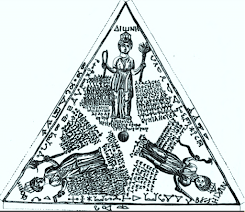Hekate’s mantras are incredibly powerful, not just for their possible meanings, but for the spiritual and physical vibrations they create. These chants are an important part of Hekatean practice. This post explores the pronunciation and the meaning of the mantras taught by Jason Miller in his course, the Sorcery of Hekate.
Originally, I drafted this for my Book of Mirrors, but after Jason Miller said the mandala rites could be conducted in the presence of people who have not taken the course, I realized that I could share Hekate’s mantras on my blog without violating any rules of confidentiality. (Q&A for Lesson 13 on 25 July 2023 at 10:44.)
At the heart of our interaction with Hekate is the foundational mantra Io Heka Io Ho. The chant isn't about mimicking ancient sounds, but an attempt to feel her teachings. This mantra expresses the honor that the goddess herself bestows. When chanting, we use notes from the B or E chords, adding depth to the sound that echoes her essence. When we sense Hekate's presence, we acknowledge her with a subtle change in the mantra: Ia Heka Io Ho.
Jason explains the mantra as follows: “Io” expresses exaltation, “Ia” imparts a celebratory note, “Heka” resonates with layers of transcendence, and “Ho” releases powerful energy. These sounds carry emotion, intention, and inexpressible meaning. When you chant these words, pay attention to how they make you feel and how your your mouth forms the sounds. The way you say the mantra is key to expressing its magical power.
Another mantra, P’horba P’horba Brimo Azzibya / Bor P’horba P’horba Brimo Azzibya, was also given to Jason by Hekate. I found the mantra difficult to say until I learned that Greek pronunciations of these words might have changed during the Hellenistic era into Forva Forva Vrimó Azivía / Vorforva Forva Vrímo Azivía. This version was easier for me to say and remember, but Jason advised me to stick to the original form that he taught.
Jason’s response surprised me because he's usually flexible about Greek pronunciation in rituals (although he did provide alternatives in the form of recordings by a presumably native speaker). One would hope that Hekate would be tolerant of mispronunciations, just as many people will be tolerant of a foreigner attempting to speak their language. One might also trust that Hekate is omniscient and understands our intentions even if poorly expressed.
The mantras transcend ordinary human communication; they are contemporary revelations from the divine. Conveying lexical meaning is not their aim; it is the sounds, the breath, and the chamber of the mouth shaping them that matter.
The mantra Io Heka Azonai encompasses Hekate’s most transcendent form. Jason suggested omitting one syllable of “Azonai” during Lesson 12, but later, in the Q&A12 for Hut 15, recommended using all three syllables. “Heka” signifies transcendence and “Azonai” echoes boundlessness. When the mantra is sung, the notes should rise, using the chords of B or E.
 |
| Drawing of a bronze tablet found at Pergamon |
Looking at ancient magical formulae, such as the Ephesian Letters, reminds us that the power of sound transcends written symbols or lexical meanings. The Ephesian Letters, words without meaning, derive their protective power from their sounds. They were believed to be ineffective when mispronounced.
While the Ephesian Letters are not part of our Hekatean practice, they do shed light on why we should pronounce the mantras as instructed by Hekate: their relevance lies in their sound.
Sound and breath are also emphasized in the Sefer Yetzirah, the earliest surviving text of linguistic theory and a cornerstone of Jewish mystical teachings. In that text, God is portrayed creating the world with sound and breath.
Just as the power of Ephesian Letters emanated from their sound, Hekate's mantras deepen our connection to the Goddess through repeated recitation. The best known Ephesian Letters are this group of six words:
Aski Kataski Lix Tetrax Thamnameneus Aisia
The Ephesian Letters, like the Sefer Yetzirah, inspired intellectual analysis. One ancient scholar speculated that “Aski” (“shadowless”) denotes “darkness,” “Kataski” (“shadowy”) resonates with the “brightness” necessary for casting shadows, “Lix” was an early term for “Earth,” “Tetrax” signifies the four seasons of the year, “Thamnameneus” echoes the name of one of a group of mythical beings, and “Aisia” signifies the “Logos.”
As intriguing as definitions and word origins are to our analytical left-brains, Hekate's mantras pertain to auditory impressions and our right-brain experience of the world. The Sefer Yetzirah emphasizes sound and breath, guiding us to recreate the world and ourselves. In this context, the structure of written letters and the lexical meaning of words are less important than the sounds they produce.
The way we chant shapes the mantra. Hekate's assurance that her mantras go beyond our current existence highlights their power to help us transcend who we are now. While perfect historical pronunciation is elusive, the voces magicae—magical sounds—also evolve over time, carrying their own enchanted energy.
In this journey, we try to stay true to Hekate’s teaching, but even if we don't say her mantras perfectly (just as the Tibetan version of the Buddhist mantra has gained power), we weave our own web of mystical sounds, filled with the transformative power that lies at the heart of our devotion to Hekate.
No comments:
Post a Comment
Thank you for commenting! I enjoy hearing from my readers and getting a chance to see their blogs, too!